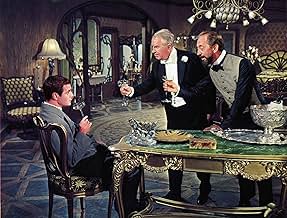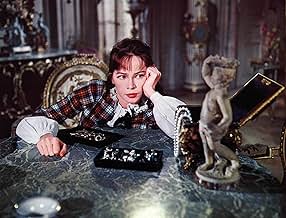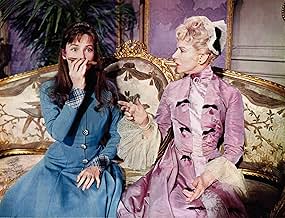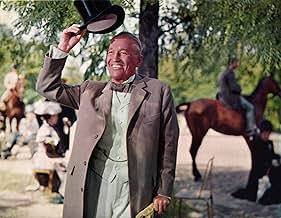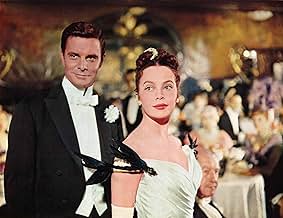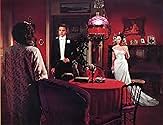Ein reicher Playboy und eine jugendliche Kurtisane in der Ausbildung, die der Konventionen der Pariser Gesellschaft überdrüssig sind, genießen eine platonische Freundschaft, die vielleicht n... Alles lesenEin reicher Playboy und eine jugendliche Kurtisane in der Ausbildung, die der Konventionen der Pariser Gesellschaft überdrüssig sind, genießen eine platonische Freundschaft, die vielleicht nicht lange platonisch bleibt.Ein reicher Playboy und eine jugendliche Kurtisane in der Ausbildung, die der Konventionen der Pariser Gesellschaft überdrüssig sind, genießen eine platonische Freundschaft, die vielleicht nicht lange platonisch bleibt.
- Regie
- Drehbuch
- Hauptbesetzung
- 9 Oscars gewonnen
- 22 Gewinne & 9 Nominierungen insgesamt
- Girl at Maxim's
- (Nicht genannt)
- Waiter at "Palais de Glace"
- (Nicht genannt)
- A boy at Jardins des Tuileries
- (Nicht genannt)
- Harlequin
- (Nicht genannt)
- Gentleman in Park
- (Nicht genannt)
- Maitre d'Hotel Maxim's
- (Nicht genannt)
- Showgirl
- (Nicht genannt)
- Restaurant Patron
- (Nicht genannt)
- Gaston's Private Secretary
- (Nicht genannt)
- Girl on Horseback at Pré Catelan
- (Nicht genannt)
Empfohlene Bewertungen
Production-wise, it's almost too lavish for its own good. Vincente Minnelli wrings every bit of artistic decor in the trappings, giving the viewer an almost claustrophobic feeling for the interior scenes. The outdoor shots are just as lavish--Louis Jourdan singing the title song among the fountains and architecture of French landmarks.
The cast is perfect. Leslie Caron makes an enchanting Gigi, Louis Jourdan is impossibly handsome as Gaston, and all of the other players were cast with a discerning eye.
But there is no denying that no matter how distasteful some will find the story of training a girl to become a courtesan to be (or how politically incorrect by today's standards), the score is as sparkling as the champagne they sing about. While, in my opinion, the score does not surpass "My Fair Lady" in range and cleverness, it certainly did well enough in winning nine Oscars, including the one for Best Picture of 1958. By all means, it has to be considered one of the last great musicals from the MGM period.
Only drawback: it's a bit overlong and could have used some editing for the slow moments.
Musicals are a rare genre on my "films I adore" list, but "Gigi" has long been a favorite film of mine, despite its sappy moments and sometimes corny jokes. What makes "Gigi" such a good film is its unmitigated Charm with a capital "C"; one can't help but grin a little when Chevalier sings "Thank Heaven for Little Girls" because he doesn't stop flashing that high voltage smile himself. And I cannot get through the scene between Chevalier and Gingold when they sing "I Remember it Well" by the seaside without tearing up because it is just so damn cute. Sure, the revelations and epiphanies are pretty easy and kind of out of nowhere, but considering it is an MGM musical from the 1950's, I would be surprised if there weren't these kinds of things. Everyone in the film looks like they are having a good time (particularly Chevalier), and the great Lerner-Loewe music against the Parisian backdrop is enough to sell me.
"Gigi", while being a 10-time Oscar winner (including Best Picture) has unfortunately been marginalized by some as a typical MGM fluff piece, could be a hard sell, particularly to the jaded Generation Y - and - younger audience. However, since I myself am probably one of the most cynical film-viewers I personally know of, take my word for it "Gigi" is a lot of fun, and a good way to spend two hours. 8/10 --Shelly
But this review isn't about "My Fair Lady". It's about one of the greatest musicals ever to be placed on cellulod - "Gigi", exquisite and as light as air!
Where do you start? The score and musical direction by Conrad Salinger and Andre Previn is one of the best. Vincente Minelli's direction frames Leslie Caron and Louis Jourdan wonderously and builds the chemistry between the two photogenic stars. Great support is provided by Hermione Gingold and the redoubtable Maurice Chevalier. Paris has never looked as glorious on film as this - amazing costume design, art direction, and set pieces.
And the songs - absolute classics! Lerner and Loewe really hit their stride with this - "Thank Heaven for Little Girls", "I Remember It Well", "The Night They Invented Champagne", and the beautiful title tune.
This movie has often served as an introduction to Maurice Chevalier for movie watchers, and he illuminates the screen. If you want to see him in another of the greatest musicals, watch "Love Me Tonight" with Jeanette MacDonald.
Thank heaven for this movie - it's a world that I would love to inhabit! I give it 10 out of 10.
Herimone Gingold is wonderful as Grandma and Jourdan is terribly handsome and suave as Gaston. Even a Gabor, the more talented Eva shines in this because there simply is not a bad moment, as for Jaques Bergerac (Mr Ginger Rogers) his role may be small, but he sure is handsome.
The score is 100 percent, The parisians is my personal favourite number, the title number is beautiful, thank heavens for little girls has become a standard, she is not thinking of me is a knockout and the night they invented champagne is wonderful, my only regret? So little dancing for the greatly talented Miss Caron.
But let's face it, this is Americanized Collette. She celebrated the deals and compromises within a sexist order that allowed a lucky few high-class prostitutes to become well-to-do, independent women in fin-de-siecle Paris (and a lot of others to at least make some kind of living). She empowered women, at a time when there just weren't many other opportunities for them to establish real independence (our current categories of PC and non-PC wouldn't have meant much then). It wasn't always pretty, but there was reality in her writing about relations between the sexes that hasn't lost its relevance.
Of course, this had to be soft-pedalled for the American audience - hence the ending, which conforms nicely with middle-class morality on this side of the Atlantic. This is the only "politically" unsatisfactory thing about the movie, however. And it remains superior - both "politically" and as a film - to My Fair Lady, where Eliza is implied to return and submit herself to Rex Harrison at the end, whereas Gigi at least implies that it's Gaston rather than Gigi who is going to have to change his ways.
My only other gripe: Why no dancing from Leslie - and from Vincente Minelli, that peerless director of dance sequences? I guess Lerner and Lowe must have been more in control of this one, and weren't of a mind for rug-cutting. Too bad - there really isn't nearly enough of Leslie dancing on film as it is!
Oscars Best Picture Winners, Ranked
Oscars Best Picture Winners, Ranked
Wusstest du schon
- WissenswertesWhen Alan Jay Lerner met Leslie Caron in London to discuss the film with her, he was surprised to discover that Caron, who was of French birth, had become so immersed in the English culture that she had lost her French accent.
- PatzerDuring Gaston's song by the pond thinking of Gigi, there is a fence in the pond forcing the swans to stay in close background. The swans, obviously confused yet undeterred, keep swimming into the fence attempting to get to the swan in deep background on the other side of the pond.
- Zitate
Aunt Alicia: Love, my dear Gigi, is a thing of beauty like a work of art, and like a work of art it is created by artists. The greater the artist the greater the art. And what makes an artist?
Gigi: Cigars and jewelry?
Aunt Alicia: Gigi, you're from another planet.
- Alternative VersionenIn some prints shown on television, we see still photos of Leslie Caron part of the time during the song "Gigi", instead of seeing Louis Jourdan singing. (This occurs after the verse and first chorus, when the orchestra plays the song while Jourdan only exclaims "Gigi!") As shown currently, we see Jourdan singing throughout the whole song, as in the theatrical release.
- VerbindungenEdited into Geschichte(n) des Kinos: Une histoire seule (1989)
- SoundtracksThank Heaven for Little Girls
(uncredited)
Lyrics by Alan Jay Lerner
Music by Frederick Loewe
Performed by Maurice Chevalier
Top-Auswahl
Details
- Erscheinungsdatum
- Herkunftsland
- Sprachen
- Auch bekannt als
- The Parisians
- Drehorte
- Venice Beach, Venice, Los Angeles, Kalifornien, USA(beach scenes)
- Produktionsfirma
- Weitere beteiligte Unternehmen bei IMDbPro anzeigen
Box Office
- Budget
- 3.319.355 $ (geschätzt)
- Laufzeit1 Stunde 55 Minuten
- Farbe
- Sound-Mix
- Seitenverhältnis
- 2.35 : 1
Zu dieser Seite beitragen



